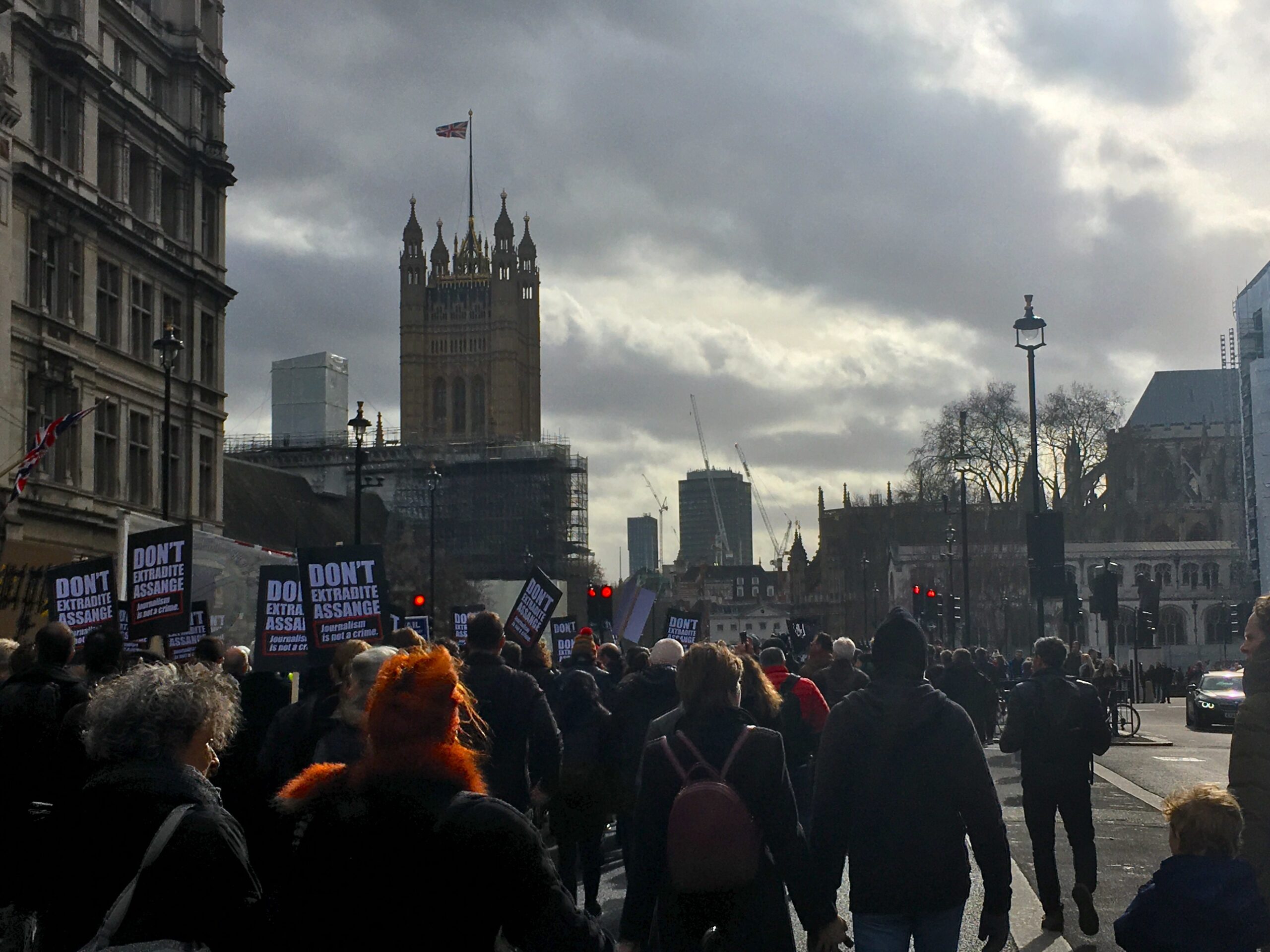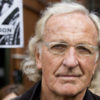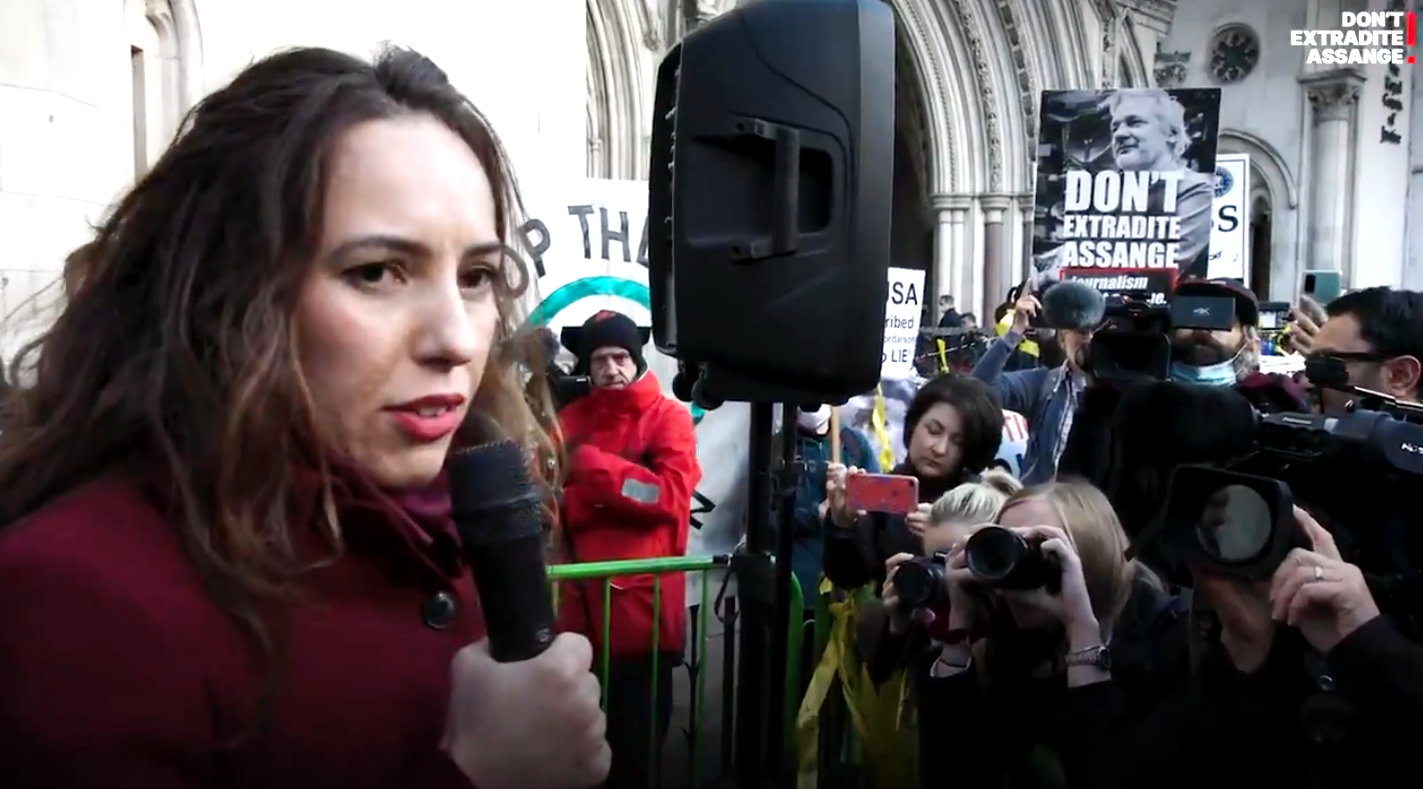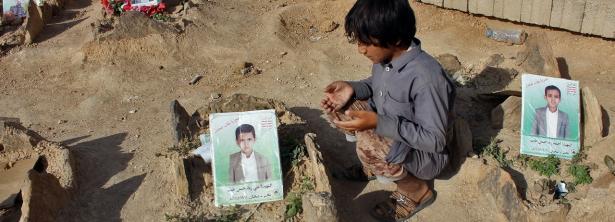Talk World Radio: Julian Assange Warned Us What Was Coming
https://davidswanson.org/talk-world-radio-julian-assange-warned-us-what-was-coming/
Julian Assange – Can Exposure Bring Justice?
January 2, 2022, 11 AM, CT,
Forum at the First Unitarian Society of Milwaukee
Panelists
Fidel Narvaez was Consul at the Ecuadorian Embassy in London for six years while Julian Assange had political asylum there.
John Kiriakou is the U.S. torture program whistleblower and former CIA chief of counterterrorism operations in Pakistan, who was tried and sentenced for his revelations in the Eastern District of Virginia.
Fidel Narvaez and John Kiriakou will use their intimate knowledge of Assange and due process in the Eastern District of Virginia to discuss how injustice has affected the public perception of Julian Assange and the trajectory of his judicial proceedings.
Our guests will detail the lack of justice at every turn in the treatment of Julian Assange, a publisher who provided evidence to the public of official corruption, murder, pedophilia, and war crimes. The fact that the American people have been kept in the dark about these injustices suggests that their exposure could reverse this trajectory, return this heroic publisher to his family, and rescue press freedom.
Unbeknownst to most Americans, the US case imploded (as described on DemocracyNow! and on The Hill’s Rising) when convicted pedophile and embezzler, Siggi Thordarson, recently recanted testimony suborned by the FBI back in 2011 with the promise of prosecutorial immunity. Siggi’s interview by the Icelandic outlet Stundin followed Julian’s 2020 Kafkaesque trial at the Old Bailey (also not covered by US media) and Judge Vanessa Baraitser’s verdict of “no extradition.” As of this writing, Assange remains confined in the UK’s maximum-security prison as the US argues Assange would not be subjected to the draconian special administrative measures to which the judge objected unless Assange prompted that response by some unspecified action, a catch-22 pointed out by Julia Hall of Amnesty International. Julian’s fiance’ Stella Moris says,
References
“Democracy Now! Attorney: U.S. Case Against Julian Assange Falls Apart, as Key Witness Says He Lied to Get Immunity,” Democracy Now! with Amy Goodman, June 28, 2021. https://www.democracynow.org/2021/6/28/julian_assange_extradition_case
“Ryan Grim: The TRUTH behind the Julian Assange Case,” by Ryan Grim, The Hill. https://www.youtube.com/watch?app=desktop&v=ufRpvfeUkak
“Key Witness Admits to Lies in Julian Assange Case by Bjartmar Oddur Þeyr Alexandersson
And Gunnar Hrafn Jónsson, Stundin, June 26, 2021. https://stundin.is/grein/13627/
“Julia Hall, Amnesty International expert on National security: ‘Assange should be released’ “ by Stephania Maurizi, Il Fatto Quotidiano, July 24, 2021.” https://www.ilfattoquotidiano.it/in-edicola/articoli/2021/07/24/julia-hall-amnesty-international-expert-on-national-security-assange-should-be-released/6272346/
“Julian Assange’s High Court fight against extradition,” by Stella Moris, updated August 6, 2021, https://www.crowdjustice.com/case/assangeappeal/
Julian Assange’s Extradition to the United States Would Result in Serious Human Rights Violations
Jacobin Magazine
The US government is begging the British High Court to allow Julian Assange to be extradited to the United States. Doing so would be a human rights disaster, given that American prisons violate the most basic human rights of political prisoners like Assange.

Julian Assange gestures to the media from a police vehicle on his arrival at Westminster Magistrates court on April 11, 2019 in London, England. (Jack Taylor / Getty Images)
For two days, British prosecutors, acting on behalf of their US counterparts, urged the UK High Court to overturn a judge’s decision blocking Julian Assange’s extradition to the United States. Although the United States’ indictment against Assange is a textbook example of a political offense, which are traditionally immune from extradition, the judge rejected Assange’s press freedom claims. Instead, she found that given the conditions of US prisons and Assange’s mental state, his extradition would place the journalist at risk of suicide.
In seeking to rebut this ruling, the US and UK prosecutors’ sadism was on full display. British prosecutors engaged in character assassination of an eminent psychiatrist who they themselves have used as an expert and implied Assange could not be suicidal or severely mentally ill as he regularly watched television in the afternoon. The proceedings also turned on the validity of US assurances that Assange would receive humane treatment in US prisons. Not only are these assurances filed with troubling holes, but even the highest standard of treatment as outlined by the United States for Assange would likely amount to torture.
This is hardly surprising given how the United States has treated whistleblowers and others accused of giving information to the media in prison. Given the United States’ miserable track record in treating political prisoners like Assange and prisoners more generally, it’s clear that a successful extradition of Assange to the United States would result in grievous violations of his human rights.
No Reassurances
Much of the United States’ assurances deal with the potential for Assange to be subject to Special Administrative Measures (SAMs) or be placed in the Administrative Maximum Facility in Florence, Colorado (ADX Florence), a supermax prison, two prospects that alarmed a UK district judge so much that she blocked extradition. The Center for Constitutional Rights has described SAMs as the “darkest corner of the U.S. federal prison system, combining the brutality and isolation of maximum security units with additional restrictions that deny individuals almost any connection to the human world.” SAMs include both physical and social isolation.
Prisoners subjected to SAMs are already in solitary confinement. SAMs forbid prisoners from communicating at all with other prisoners. Only approved family members and lawyers may speak to someone under a SAM, and these calls are monitored by the FBI.
A successful extradition of Assange to the United States would result in grievous violations of his human rights.
The SAMs apply not only to the prisoner but impose gag orders on those that are approved to speak with them, including lawyers. Prisoners subject to SAMs are restricted in what information they can receive from the outside world, with prison officials being allowed to censor periodicals about current events.
SAMs are reserved for national security and terrorism cases. Assange has stated he thinks he may be subject to them: Joshua Schulte, the accused source for WikiLeaks Vault 7 revelations, has been subject to SAMs since October 2018. Schulte maintains he is not the Vault 7 source and told officials that whoever was should be “executed.” In March 2020, a jury failed to reach a verdict on the Espionage Act charges against him. The government is seeking to retry Schulte, and he remains in jail, subject to SAMs, in solitary confinement, and not allowed to go outside after over three years.
The United States has not guaranteed Assange will not be subject to SAMs. Instead, they’ve assured that Assange would only be subject to SAMs if, after he was extradited to the United States, he committed an action that warranted imposing them.
This is hardly reassuring. The discretion to impose SAMs rests with the attorney general, and the way attorneys general have imposed SAMs is arbitrary, without any due process. SAMs cut off not only defendants but their attorneys from communicating with the media — a longtime goal of the United States and others when it comes to Assange.
In blocking extradition, the district judge decided that if convicted, Assange would likely be sent to ADX Florence. In this prison, inmates are confined to their cells for twenty-three hours a day. In the eight-by-twelve-foot cells, everything, including the furniture, is made of concrete. Like with the SAMs, the United States has offered assurances about ADX Florence that are full of holes. The United States assures Assange would not be held there posttrial unless “after entry of this assurance, [Assange] was to commit any future act that then meant he met the test for such designation.”
While the assurances are hardly reassuring, what is equally troubling is Assange’s fate even if the assurances are kept. In a declaration to British courts, assistant US attorney Gordon Kromberg asserted that if Assange is brought to the United States and subjected to pretrial detention, he will most likely be held at the William G. Truesdale Alexandria Adult Detention Center in Alexandria, Virginia. Kromberg claimed there is no solitary confinement at the Alexandria Detention Center before he described in detail the jail’s protective custody and administrative segregation housing units. Inmates in protective custody are not allowed to interact with other inmates. Inmates in administrative segregation, according to Kromberg’s declaration, are kept in their cells twenty-two hours a day.
British prosecutors rejected the claims that holding a person by themselves in a cell for twenty-two hours a day constituted solitary confinement. To make this point, they drew on Kromberg’s statements that “inmates in administrative segregation are able to speak to one other through the doors and windows of their cells” and that inmates in administrative segregation can meet with lawyers.
The United States’ claims, as parroted by British prosecutors, that Assange would not face solitary confinement, are patently absurd. The United Nations (UN) Standard Minimum Rules for the Treatment of Prisoners (the “Nelson Mandela Rules”) defines solitary confinement as “22 hours or more a day without meaningful human contact.” Under the Mandela Rules, solitary confinement in excess of fifteen consecutive days constitutes prolonged solitary confinement. Two successive UN special rapporteurs on torture have stressed that prolonged solitary confinement violates international human rights law and can very likely amount to torture. This is especially the case when inflicted on prisoners like Assange with preexisting mental health problems.
JOHN PILGER: Justice for Assange Is Justice for All
In the land of Magna Carta this disgraceful case ought to have been hurled out of court long ago.

Assange supporters march on Parliament, February 2020. (Joe Lauria)
By John Pilger
Special to Consortium News

When I first saw Julian Assange in Belmarsh prison, in 2019, shortly after he had been dragged from his refuge in the Ecuadorian embassy, he said, “I think I am losing my mind.”
He was gaunt and emaciated, his eyes hollow and the thinness of his arms was emphasized by a yellow identifying cloth tied around his left arm, an evocative symbol of institutional control.
For all but the two hours of my visit, he was confined to a solitary cell in a wing known as “healthcare,” an Orwellian name. In the cell next to him a deeply disturbed man screamed through the night. Another occupant suffered from terminal cancer. Another was seriously disabled.
“One day we were allowed to play Monopoly,” he said, “as therapy. That was our healthcare!”
“This is One Flew Over the Cuckoo’s Nest,” I said.
“Yes, only more insane.”
Julian’s black sense of humour has often rescued him, but no more. The insidious torture he has suffered in Belmarsh has had devastating effects. Read the reports of Nils Melzer, the UN special rapporteur on torture, and the clinical opinions of Michael Kopelman, emeritus professor of neuropsychiatry at King’s College London and Dr. Quentin Deeley, and reserve a contempt for America’s hired gun in court, James Lewis QC, who dismissed this as “malingering.”
“Julian’s black sense of humour has often rescued him, but no more. The insidious torture he has suffered in Belmarsh has had devastating effects.”
I was especially moved by the expert words of Dr. Kate Humphrey, a clinical neuropsychologist at Imperial College, London. She told the Old Bailey last year that Julian’s intellect had gone from “in the superior, or more likely very superior, range” to “significantly below” this optimal level, to the point where he was struggling to absorb information and “perform in the low to average range.”
At yet another court hearing in this shameful Kafkaesque drama, I watched him struggle to remember his name when asked by the judge to state it.
For most of his first year in Belmarsh, he was locked up. Denied proper exercise, he strode the length of his small cell, back and forth, back and forth, for “my own half-marathon,” he told me. This reeked of despair. A razor blade was found in his cell. He wrote “farewell letters.” He phoned the Samaritans repeatedly.
At first, he was denied his reading glasses, left behind in the brutality of his kidnapping from the embassy. When the glasses finally arrived at the prison, they were not delivered to him for days. His solicitor, Gareth Peirce, wrote letter after letter to the prison governor protesting the withholding of legal documents, access to the prison library, the use of a basic laptop with which to prepare his case. The prison would take weeks, even months, to answer. (The governor, Rob Davis, has been awarded an Order of the British Empire.)
Books sent to him by a friend, the journalist Charles Glass, himself a survivor of hostage-taking in Beirut, were returned. Julian could not call his American lawyers. From the start, he has been constantly medicated. Once, when I asked him what they were giving him, he couldn’t say.
Right to Appear in Court
At last week’s High Court hearing to decide finally whether or not Julian would be extradited to America, he appeared only briefly by video link on the first day. He looked unwell and unsettled. The court was told he had been “excused” because of his “medication.” But Julian had asked to attend the hearing and was refused, said his partner Stella Moris. Attendance in a court sitting in judgement on you is surely a right.

Stella Moris, Julian Assange’s partner, addressing his supporters on Oct 28, during the U.S. appeal hearing in London. (Don’t Extradite Assange Campaign)
This intensely proud man also demands the right to appear strong and coherent in public, as he did at the Old Bailey last year. Then, he consulted constantly with his lawyers through the slit in his glass cage. He took copious notes. He stood and protested with eloquent anger at lies and abuses of process.
The damage done to him in his decade of incarceration and uncertainty, including more than two years in Belmarsh (whose brutal regime is celebrated in the latest Bond film) is beyond doubt.
But so, too, is his courage beyond doubt, and a quality of resistance and resilience that is heroism. It is this that may see him through the present Kafkaesque nightmare — if he is spared an American hellhole.
I have known Julian since he first came to Britain in 2009. In our first interview, he described the moral imperative behind WikiLeaks: that our right to the transparency of governments and the powerful was a basic democratic right. I have watched him cling to this principle when at times it has made his life even more precarious.
Almost none of this remarkable side to the man’s character has been reported in the so-called free press whose own future, it is said, is in jeopardy if Julian is extradited.
Of course, but there has never been a ”free press.” There have been extraordinary journalists who have occupied positions in the “mainstream” — spaces that have now closed, forcing independent journalism on to the internet.
There, it has become a “fifth estate,” a samizdat of dedicated, often unpaid work by those who were honourable exceptions in a media now reduced to an assembly line of platitudes. Words like “democracy,” “reform,” “human rights” are stripped of their dictionary meaning and censorship is by omission or exclusion.
“Almost none of this remarkable side to the man’s character has been reported in the so-called free press whose own future, it is said, is in jeopardy if Julian is extradited.”
Last week’s fateful hearing at the High Court was “disappeared” in the “free press.” Most people would not know that a court in the heart of London had sat in judgement on their right to know: their right to question and dissent.
Many Americans, if they know anything about the Assange case, believe a fantasy that Julian is a Russian agent who caused Hillary Clinton to lose the presidential election in 2016 to Donald Trump. This is strikingly similar to the lie that Saddam Hussein had weapons of mass destruction, which justified the invasion of Iraq and the deaths of a million or more people.
They are unlikely to know that the main prosecution witness underpinning one of the concocted charges against Julian has recently admitted he lied and fabricated his “evidence.”
Neither will they have heard or read about the revelation that the CIA, under its former director, the Hermann Goering lookalike Mike Pompeo, had planned to assassinate Julian. And that was hardly new. Since I have known Julian, he has been under threat of harm and worse.
On his first night in the Ecuadorian embassy in 2012, dark figures swarmed over the front of the embassy and banged on the windows, trying to get in. In the U.S., public figures — including Hillary Clinton, fresh from her destruction of Libya — have long called for Julian’s assassination. The current President Joe Biden damned him as a “hi-tech terrorist.”
The former prime minister of Australia, Julia Gillard, was so eager to please what she called “our best mates” in Washington that she demanded Julian’s passport be taken from him — until it was pointed out to her that this would be against the law. The current prime minister, Scott Morrison, a PR man, when asked about Assange, said, “He should face the music.”
It has been open season on the WikiLeaks’ founder for more than a decade. In 2011, The Guardian exploited Julian’s work as if it was its own, collected journalism prizes and Hollywood deals, then turned on its source.
Vituperative Assaults
Years of vituperative assaults on the man who refused to join their club followed. He was accused of failing to redact documents of the names of those considered at risk. In a Guardian book by David Leigh and Luke Harding, Assange is quoted as saying during a dinner in a London restaurant that he didn’t care if informants named in the leaks were harmed.
Neither Harding nor Leigh was at the dinner. John Goetz, an investigations reporter with Der Spiegel, actually was at the dinner and testified that Assange said nothing of the kind.
The great whistleblower Daniel Ellsberg told the Old Bailey last year that Assange had personally redacted 15,000 files. The New Zealand investigative journalist Nicky Hager, who worked with Assange on the Afghanistan and Iraq war leaks, described how Assange took “extraordinary precautions in redacting names of informants.”
In 2013, I asked the film-maker Mark Davis about this. A respected broadcaster for SBS Australia, Davis was an eyewitness, accompanying Assange during the preparation of the leaked files for publication in The Guardian and The New York Times. He told me, “Assange was the only one who worked day and night extracting 10,000 names of people who could be targeted by the revelations in the logs.”
Lecturing a group of City University students, David Leigh mocked the very idea that “Julian Assange will end up in an orange jumpsuit.” His fears were an exaggeration, he sneered. Edward Snowden later revealed that Assange was on a “manhunt timeline.”
Luke Harding, who co-authored with Leigh the Guardian book that disclosed the password to a trove of diplomatic cables that Julian had entrusted to the paper, was outside the Ecuadorian embassy on the evening Julian sought asylum. Standing with a line of police, he gloated on his blog, “Scotland Yard may well have the last laugh.”
The campaign was relentless. Guardian columnists scraped the depths. “He really is the most massive turd,” wrote Suzanne Moore of a man she had never met.
The editor who presided over this, Alan Rusbridger, has lately joined the chorus that “defending Assange protects the free press.” Having published the initial WikiLeaks revelations, Rusbridger must wonder if the Guardian’s subsequent excommunication of Assange will be enough to protect his own skin from the wrath of Washington.
The High Court judges are likely to announce their decision on the U.S. appeal in the new year. What they decide will determine whether or not the British judiciary has trashed the last vestiges of its vaunted reputation; in the land of Magna Carta this disgraceful case ought to have been hurled out of court long ago.
The missing imperative is not the impact on a collusive “free press.” It is justice for a man persecuted and willfully denied it.
Julian Assange is a truth-teller who has committed no crime but revealed government crimes and lies on a vast scale and so performed one of the great public services of my lifetime. Do we need to be reminded that justice for one is justice for all?
First published by Consortium News


Showing 1 reaction
Sign in with